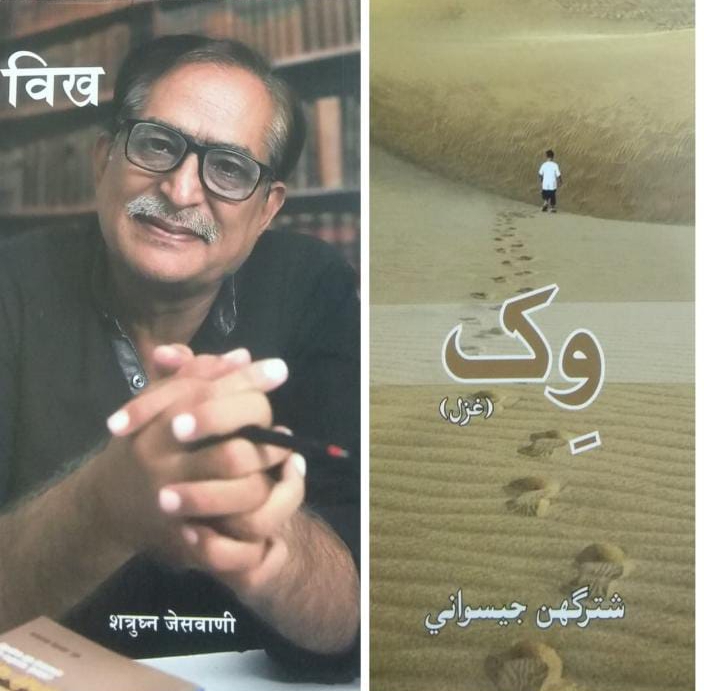
Renowned writer and poet Sharughan’s book was launched in Bilaspur India on February 28
By Nasir Aijaz
Rajesh Kumar Parasramani, based in Indian city of Bilaspur, possesses many qualities – besides serving at State Bank of India, he is a noted Sindhi Sarangi player; developer of his own one-piece wooden Sindhi Sarangi and later an electric Sindhi Sarangi; easy code method of Braille for visually-impaired Sarangi learners, author of a book on Sindhi Sarangi and the other one on Sindhi Folk Music; founder of the Sindhi Sarangi Gharana etc. And the last, but not least – he has the spirit and consistency to promote Sindhi folk music and musical equipment.
For about three years, Rajesh had been in constant touch with me, during which he, not only kept me updated on his efforts, but also connected me with certain other Sindhis of Bilaspur, who had been playing active role in different spheres of life for the community. A few days back, he introduced Mr. Shatrughan Jaswani, a Sindhi Poet, well known in Indian Sindhi literary and art circles, but hitherto unknown to me.
Sharing the title of a book on WhatsApp, Rajesh told, “Mr. Shatrughan Jaswani is a poet from Bilaspur city of Chhattisgarh state. His book, compilation of Sindhi ghazals titled ‘Vikh’ (A step) was launched on February 28, 2023 at an auditorium in Bilaspur.”
“The book contains 41 Sindhi ghazals and the uniqueness of the poetry book is that it is written in Perso-Arabic as well as Devnagri script,” he said arousing my curiosity to know further and ask for soft copy of the book.
Interestingly, Shatrughan’s wife Ms. Kanchan Jaswani was his source of inspiration. “My wife advised me to write poetry in Sindhi language.”
On my request, Rajesh contacted the poet and got the soft copy of the book as well as a brief sketch of his life.
Shatrughan Jaswani in a brief text message and a voice message shared that his ancestors belonged to Khairpur Nathan Shah town of Sindh, however he was born on December 22, 1961 in Bilaspur. “My association with Hindi literature and plays started in 1979, and also directed and acted in plays but writing Sindhi poetry began from 2001,” Shatrughan told, who is in accounting business.
Interestingly, Shatrughan’s wife Ms. Kanchan Jaswani was his source of inspiration. “My wife advised me to write poetry in Sindhi language.”
The first collection of his Sindhi short poems was published in 2014 with the support of Chhattisgarh Sindhi Sahitya Akademi and the second book of Sindhi ghazals titled as ‘Vikh’ was published in 2022 and launched in February last.
The book contains prologue by two renowned authors – one by Kailash Shadab, a renowned writer and poet from Raipur, whom I had met in Karachi during a literary conference organized by Sindh Madrastul Islam University in 2014, and the other one by Ms. Vinita Bhavnani.
Ms. Vinta Bhavnani’s brief note contains the introduction of poet Shatrughan Jaswani. According to her, Shatrughan Jaswani is an acclaimed poet, short story writer and dramatist. ‘Marriage Proposal’, one of his plays, was so popular that it was staged seven times at different places in 2015. He is also the writer of a Sindhi film ‘Munhji Shadi Karae’.
Commenting on uniqueness of book, having published in two scripts – Perso Arabic and Devnagri, Vinita Bhavnani hoped that it would prove helpful to young generation of Sindhis.
On the purity and innocence of Shatrughan’s poetry, Kailash says, “The poet doesn’t know the wickedness of words.”
Kailash Shadab has reviewed the book in detail, discussing almost every aspect of Sindhi literature, particularly the poetry, produced in post-partition era. According to him, the Sindhi literature in India had always been under the influence of feelings of ‘up-rootedness’. Referring to the partition literature, which reflected the pains of being displaced from ancestral abodes in Sindh migration and living in refugee camps in new land in India, Kailash comments that for Sindhi writers, authoring prose or poetry with pure literary touch, had been optional, but Shatrughan Jaswani has broken that trend and entered into a new era through this poetry book. He describes the transformation of the poet as ‘Leaving the one and entering into the world of another suffering’, as according to him writing the poetry itself is a ‘world of sufferings’.
Kailash Shadab finds a ‘Situational Authenticity’ in the poetry of Shatrughan Jaswani and quotes several poems from the collection.
“Shatrugha’s poetry is reflection of his personal lifelong experiences, as he has been writing in Hindi since school days,” Kailash writes.
On the purity and innocence of Shatrughan’s poetry, Kailash says, “The poet doesn’t know the wickedness of words.”
Kailash Shadab has also discussed in detail the Behar (meter) used by Shatrughan in his poetry, and reviewed it in the light of behars used by various poets from Ghalib to Narain Shayam.
Kailash Shadab finds a ‘Situational Authenticity’ in the poetry of Shatrughan Jaswani and quotes several poems from the collection.
The book contains heart-touching poems, but I will end my note with two lines from a ghazal with which the collection begins. Shatrughan Jaswani, perhaps, has never visited Sindh, but this ghazal reflects his longing for Sindh and feelings of repentance:
ڇڏي مون سنڌ ڄڻ پنھنجي سڄي دنيا ڇڏي آيس
مِليا ھِت ڪارخانا، کيت پر سونا ڇڏي آيس
Leaving Sindh was like I left behind my entire world
I have factories here, alas I left behind the golden fields!
___________________
Nasir Aijaz is a Karachi-based senior journalist, and author of nine books on literature, language and history. He can be accessed at nasir.akhund1954@gmail.com